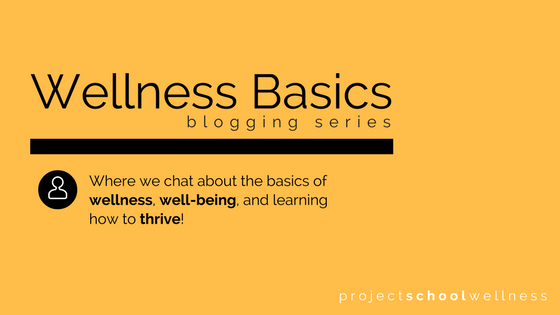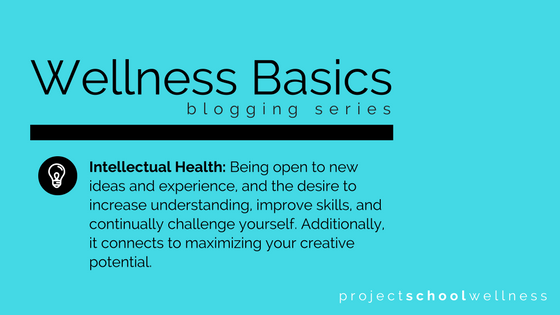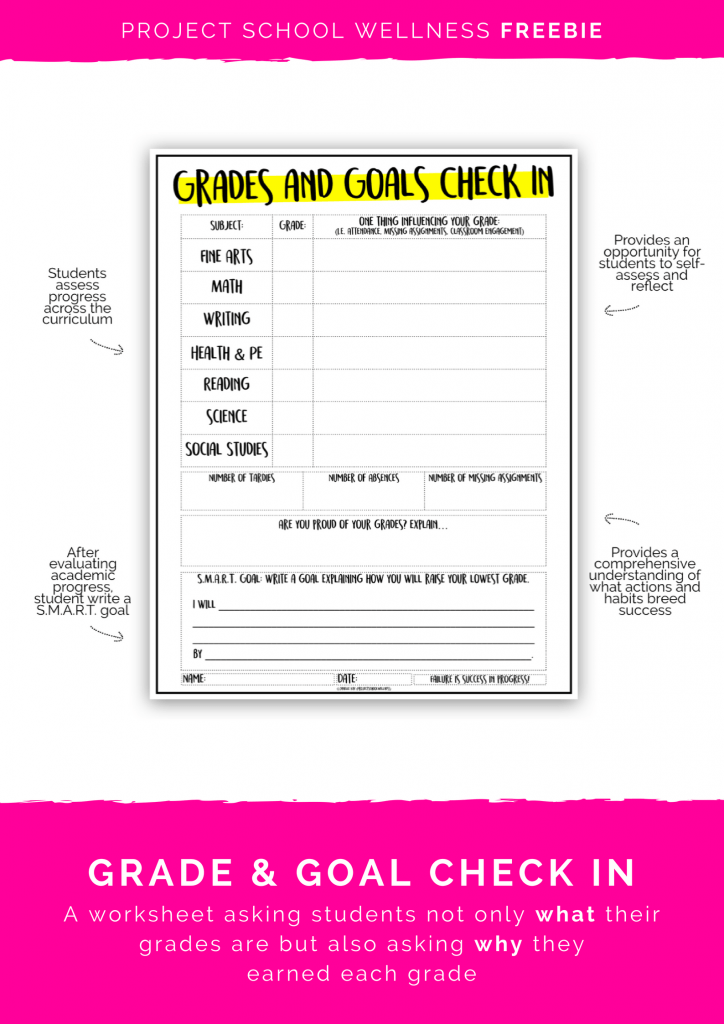Wellness Basics: Intellectual Health
Free Grades & Goals Check-In Worksheet
Welcome back to the Wellness Basics Blogging Series, where we chat about the basics of wellness, well-being, and learning how to thrive!
In the first installment, I introduced you guys to the Wellness Wheel. For a quick refresher, the Wellness Wheel is a simple and easy-to-use tool for understanding and assessing the multidimensional nature of health (No worries if you missed it, just click here to get caught up).
A key element of the Wellness Wheel is the idea that each wedge or component of health is equally valuable and important to total well-being. So as we move forward it's time to build on that understanding by diving into the components of health and wellness.
Our first stop, Intellectual Health.
What is Intellectual Health?
Intellectual Health is vitally important in creating sustainable health and happiness. It is what pushes us forward, empowers us to learn from adversity, and think critically as we navigate life (and not just intellectually, but also emotionally, physically, and spiritually). As we activate and strengthen Intellectual Health, we are able to create, innovate, and grow in unimaginable ways.
»»» Definition: Intellectual Health refers to being open to new ideas and experiences, and the desire to increase understanding, improve skills, and continually challenge yourself. Additionally, it connects to maximizing your creative potential.
Intellectually Healthy Habits
Understanding Intellectual Health and its value in life is meaningless without action and application. So here are a few healthy habits connected to thriving Intellectual Health.
- Cultivate a love for learning and discovery
- Possess a growth mindset and hold strong to the truth that you are always cable of doing more
- Learn to view challenges and struggles as opportunities for growth
- Set S.M.A.R.T. goals and exercising deliberate practice in working towards goals
- Live by a standard of taking ownership and responsibility for learning
How can educators and stakeholders influence and impact Intellectual Health*
As educators, I don't have to tell you how influential (positively and negatively) you are in a student's life. You have a great power to nurture and strengthen Intellectual Health and total well-being by the culture you choose to create in your classroom. Here are a few ways to integrate an intentional focus of Intellectual Health:
- Let students take control of their learning and allow creativity and imagination to flourish - i.e. the genius hour and open-ended projects
- Instituting “Yes, and!” as a classroom norm
- Establishing a common understanding and standard of growth mindset and grit
- Teach students how to develop S.M.A.R.T. goals along with corresponding plans of deliberate practice
- Creating a routine of self-assessment and regular reflection
*My guess is that you are already doing many of these things in your classroom. If you are, the next step is to connect current practices to a common understanding and language of health and wellness.
Want to learn more?
This post is just the tip of the iceberg. If you are interested in learning more, here are a few resources I found very insightful and educational:
- Read: Grit by Angela Duckworth, PhD
- Listen: Deliberate Practice, Freakonomics Radio
- Watch: Yes, And by Karen Tilstra, PhD
Free Student Progress Check-In
Empower Intellectual Health
Now, you didn't think I'd tell you all about Intellectual Health without giving you some tool for integrating it into your classroom, did you? Here are two teaching resources you can use to strengthen Intellectual Health...
Next time we'll continue our quest to fully understand each of the components of health and learn how to empower our students to thrive as we discuss Spiritual Health.
Free Resource Library
Grab the freebie featured in this post, along with 30+ other free goodies in our Free Resource Library! Sign up below for instant access.
Hello. I'm Janelle!
A middle school health teacher turned curriculum developer (and #WAHM). I'm on a mission to share the easiest-to-teach, most impactful health lesson plans on the Internet. Because your time and energy is better spent on teaching and connecting, not on planning and prep.




